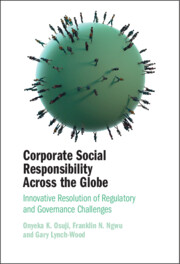 Corporate Social Responsibility Across the Globe
Corporate Social Responsibility Across the Globe Book contents
- Corporate Social Responsibility Across the Globe
- Corporate Social Responsibility Across the Globe
- Copyright page
- Epigraph
- Contents
- Figures
- Table of Cases
- Table of Legislation
- 1 Introduction: The Centrality of Regulation in Corporate Responsibility
- Part I Regulation Concepts, Paradigms and Approaches for Corporate Social Responsibility
- Part II Infusing Corporate Social Responsibility in Corporate Governance
- Part III Stimulating Private Regulation of Corporate Social Responsibility
- References
1 - Introduction: The Centrality of Regulation in Corporate Responsibility
Published online by Cambridge University Press: 15 June 2023
- Corporate Social Responsibility Across the Globe
- Corporate Social Responsibility Across the Globe
- Copyright page
- Epigraph
- Contents
- Figures
- Table of Cases
- Table of Legislation
- 1 Introduction: The Centrality of Regulation in Corporate Responsibility
- Part I Regulation Concepts, Paradigms and Approaches for Corporate Social Responsibility
- Part II Infusing Corporate Social Responsibility in Corporate Governance
- Part III Stimulating Private Regulation of Corporate Social Responsibility
- References
Summary
This chapter introduces the book and its inspiration, mission, central research questions and structure. It links the effectiveness of corporate social responsibility (CSR) to better understanding of its interdependent relationship with law, regulation and governance. The chapter shows that the book is unconstrained by conventional understandings and the neo-liberal voluntarism orthodoxy of some disciplines in suggesting opportunities for tackling substantive and procedural barriers for CSR in public international law, private international law and national law. It underlines the need for contextualism and a spectrum for possible legal and regulatory intermediation in fifteen ingredients of CSR.
Keywords
- Type
- Chapter
- Information
- Corporate Social Responsibility Across the GlobeInnovative Resolution of Regulatory and Governance Challenges, pp. 1 - 8Publisher: Cambridge University PressPrint publication year: 2023


